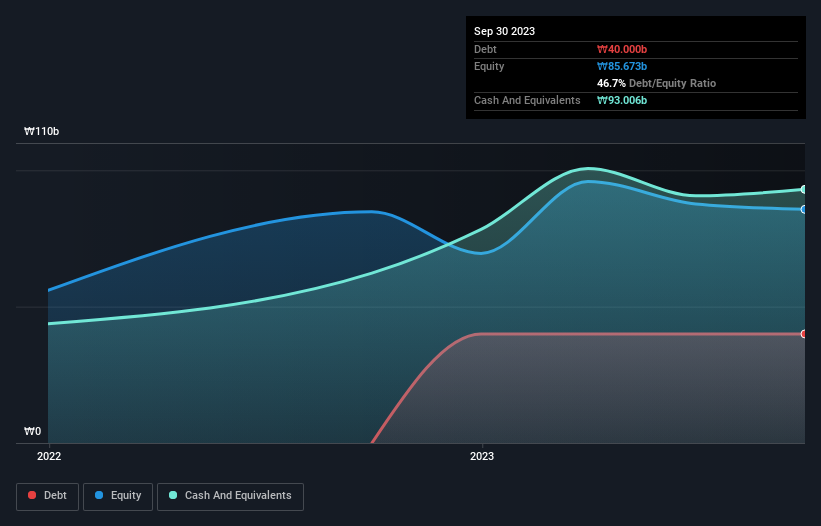Warren Buffett famously said, 'Volatility is far from synonymous with risk.' It's only natural to consider a company's balance sheet when you examine how risky it is, since debt is often involved when a business collapses. We can see that ABL Bio Inc. (KOSDAQ:298380) does use debt in its business. But the real question is whether this debt is making the company risky.
When Is Debt A Problem?
Generally speaking, debt only becomes a real problem when a company can't easily pay it off, either by raising capital or with its own cash flow. If things get really bad, the lenders can take control of the business. While that is not too common, we often do see indebted companies permanently diluting shareholders because lenders force them to raise capital at a distressed price. Of course, plenty of companies use debt to fund growth, without any negative consequences. The first step when considering a company's debt levels is to consider its cash and debt together.
See our latest analysis for ABL Bio
What Is ABL Bio's Debt?
You can click the graphic below for the historical numbers, but it shows that as of September 2023 ABL Bio had ₩40.0b of debt, an increase on none, over one year. But it also has ₩93.0b in cash to offset that, meaning it has ₩53.0b net cash.

How Strong Is ABL Bio's Balance Sheet?
According to the last reported balance sheet, ABL Bio had liabilities of ₩87.6b due within 12 months, and liabilities of ₩1.38b due beyond 12 months. Offsetting these obligations, it had cash of ₩93.0b as well as receivables valued at ₩325.0m due within 12 months. So it can boast ₩4.30b more liquid assets than total liabilities.
This state of affairs indicates that ABL Bio's balance sheet looks quite solid, as its total liabilities are just about equal to its liquid assets. So while it's hard to imagine that the ₩1.08t company is struggling for cash, we still think it's worth monitoring its balance sheet. Succinctly put, ABL Bio boasts net cash, so it's fair to say it does not have a heavy debt load! When analysing debt levels, the balance sheet is the obvious place to start. But it is future earnings, more than anything, that will determine ABL Bio's ability to maintain a healthy balance sheet going forward. So if you're focused on the future you can check out this free report showing analyst profit forecasts.
Over 12 months, ABL Bio reported revenue of ₩67b, which is a gain of 16%, although it did not report any earnings before interest and tax. That rate of growth is a bit slow for our taste, but it takes all types to make a world.
So How Risky Is ABL Bio?
Although ABL Bio had an earnings before interest and tax (EBIT) loss over the last twelve months, it generated positive free cash flow of ₩1.3b. So although it is loss-making, it doesn't seem to have too much near-term balance sheet risk, keeping in mind the net cash. We'll feel more comfortable with the stock once EBIT is positive, given the lacklustre revenue growth. There's no doubt that we learn most about debt from the balance sheet. However, not all investment risk resides within the balance sheet - far from it. We've identified 1 warning sign with ABL Bio , and understanding them should be part of your investment process.
When all is said and done, sometimes its easier to focus on companies that don't even need debt. Readers can access a list of growth stocks with zero net debt 100% free, right now.
New: Manage All Your Stock Portfolios in One Place
We've created the ultimate portfolio companion for stock investors, and it's free.
• Connect an unlimited number of Portfolios and see your total in one currency
• Be alerted to new Warning Signs or Risks via email or mobile
• Track the Fair Value of your stocks
Have feedback on this article? Concerned about the content? Get in touch with us directly. Alternatively, email editorial-team (at) simplywallst.com.
This article by Simply Wall St is general in nature. We provide commentary based on historical data and analyst forecasts only using an unbiased methodology and our articles are not intended to be financial advice. It does not constitute a recommendation to buy or sell any stock, and does not take account of your objectives, or your financial situation. We aim to bring you long-term focused analysis driven by fundamental data. Note that our analysis may not factor in the latest price-sensitive company announcements or qualitative material. Simply Wall St has no position in any stocks mentioned.
About KOSDAQ:A298380
ABL Bio
A biotech research company, focuses on the development of therapeutic drugs for immuno-oncology and neurodegenerative diseases.
Reasonable growth potential with adequate balance sheet.
Market Insights
Community Narratives




